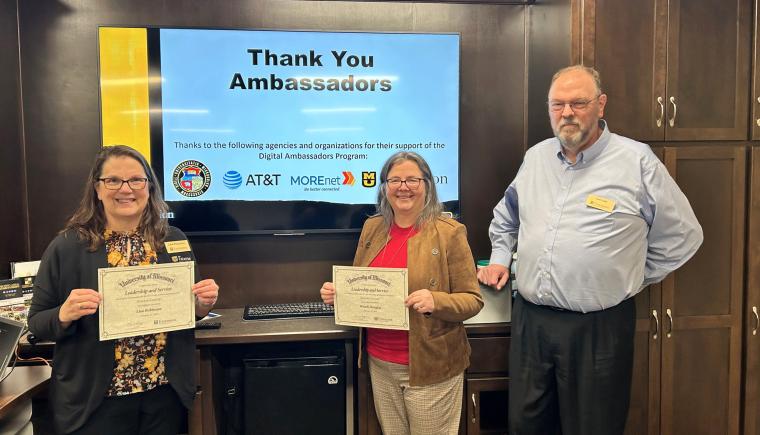When Lisa Robinson’s mother was in hospice care, an online consultation with a trusted doctor brought a quick diagnosis, a prescription to clear up an infection — and peace of mind.
That experience prompted Robinson, a University of Missouri Extension field specialist, to volunteer to lead a Digital Ambassador pilot project in Newton County.
“My mother had no idea until I helped her that we could do all this from her home,” Robinson said. “There are so many opportunities available now, from telehealth to working and taking classes from home to accessing all kinds of important information — provided you have access to the internet. That’s what the Digital Ambassador program is all about: helping people realize these opportunities are available and then teaching them how to safely use them.”
Similar in format to MU Extension’s popular Master Gardener program, the Digital Ambassador program uses the “train the trainer” model to coach volunteers through 14 modules covering online basics, connectivity issues, costs, uses, security and more.
These knowledgeable ambassadors are equipped to help others become confident digital users who, in turn, can share their knowledge with others, said Alison Copeland, UM System deputy chief engagement officer and coordinator of the UM System Broadband Initiative.
The program, which was piloted last winter and spring in Newton, Jefferson and Nodaway counties, is a collaboration between MOREnet and the University of Missouri System. AT&T provided additional support for two of the three pilot projects. A fourth pilot, in June, will train GoSEMO Electric Cooperative staff in Sikeston and some MU Extension faculty in southeastern Missouri.
With MU Extension specialists’ guidance, the pilot projects provided insights that can inform the program when it is eventually rolled out statewide, said Noah Washburn, MU Extension state specialist who leads the Digital Ambassador program.
In Jefferson County, MU Extension engagement specialist Mistti Ritter focused on promoting the program to trusted partners such as churches and community organizations. She also envisions offering trainings to emergency management and disaster response organizations.
“Applying for or renewing almost any kind of aid or support — including SNAP food or employment benefits, home weatherization and even disaster relief funds — is premised on initial online interactions,” Ritter said. “In instances where people don’t have access to the internet or to community volunteers and service agency representatives who can help them, people are delayed and sometimes overlooked in getting help. It seems like a natural fit for future sessions across the state to train community volunteers and agency reps to be digital ambassadors.”
Steve Glauber was among the first volunteers to go through the Jefferson County training. A retired CPA and an AARP volunteer who helps seniors prepare their taxes, Glauber moved from Belleville, Illinois, “where I never had issues with connectivity, to here, where there was no connectivity. I loved where we moved in retirement but hated the lack of connectivity.”
His tech-savvy son helped him find workarounds, but the experience made him aware of the great need that was out there. When he heard about the Digital Ambassador program, he volunteered. “I thought maybe I can learn something and help somebody,” he said. “We can’t leave people behind because of their lack of knowledge about tech.”
In northwestern Missouri’s Nodaway County, Rita Wallinga was desperate for resources to meet a local public library’s request to educate seniors on internet fraud as part of her work for Young at Heart Resources Area Agency on Aging, which serves 18 counties in northwestern Missouri.
She remembered seeing a flyer about the Digital Ambassador program and contacted Jackie Spainhower, a MU Extension field specialist in community development. Spainhower connected her with county extension council member Chris Wallace, who had taken the Digital Ambassador training and volunteered to present.
Copeland notes that there is a different level of trust and accountability involved when volunteers are helping people with internet-based services, many of which involve highly personal information. The need is so great in Missouri that it may also be a challenge to draw clear boundaries around volunteers’ availability in responding to people’s questions. These challenges demonstrate the vital need for such a program of well-trained and engaged volunteers.
“A lot of people are in danger of being left behind,” Robinson said. “They just aren’t aware of how many essential things are now internet-based. That’s why the Digital Ambassador program can be so important. It allows trusted community volunteers to have those individual conversations with people, helping make a difference in their everyday lives.”
If you are interested in learning more about the Digital Ambassador program and future training sessions, visit Digital Ambassador program.
Photo
Lisa Robinson and Wendi Douglas
MU Extension specialist Lisa Robinson, left, and community member Wendi Douglas, center, completed Digital Ambassador training in Newton County. Joe Lear, right, consultant for UM System broadband initiatives, guided participants through the course.
Writer: Katherine Foran
